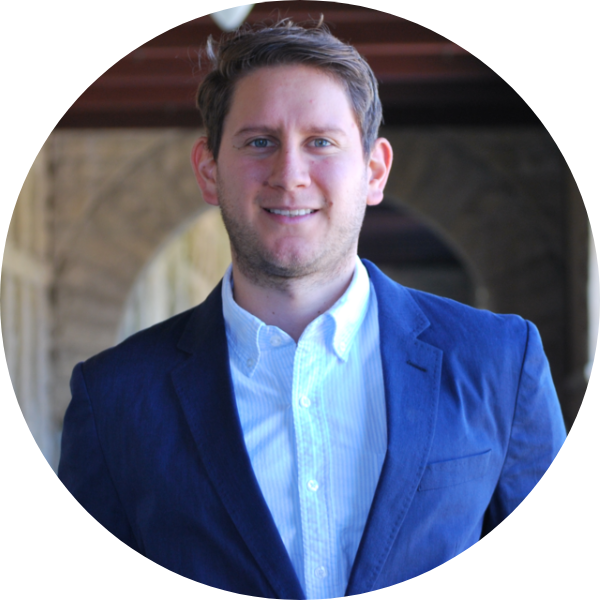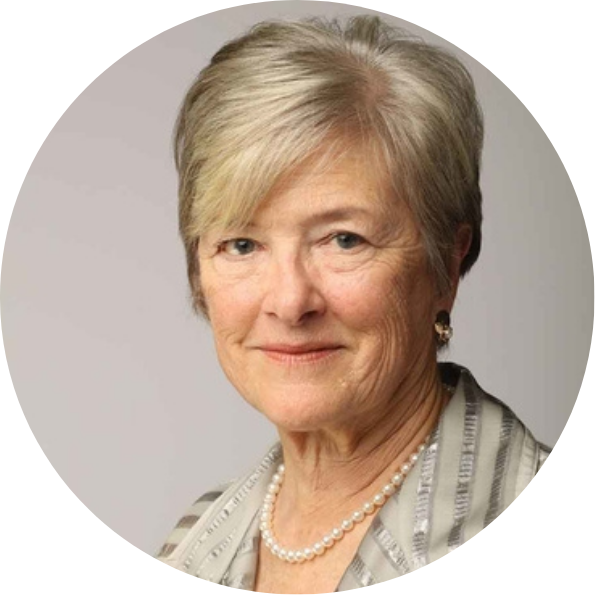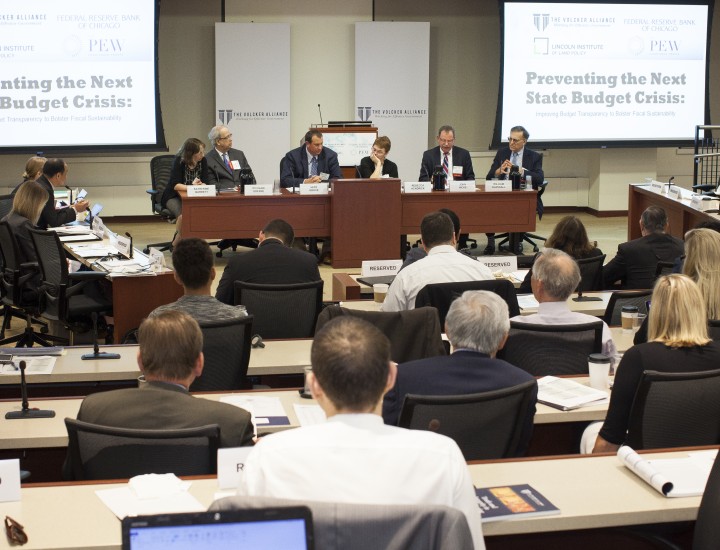Special Briefing: Doom Loop or Boom Loop—Work from Home and the Challenges Facing US Cities

Ever since the arrival of the COVID-19 pandemic in the US in 2020 led to a surge in people working from home, New York and other big cities have been forced to reckon with the possibility of a Doom Loop scenario of vacant offices and flagging economies. But given the right set of policies, cities can reverse their fortunes and embark upon a path to a Boom Loop of greater productivity and economic growth. Join our next Special Briefing as the authors of the forthcoming Volcker Alliance issue paper, Doom Loop or Boom Loop: Work from Home and the Challenges Facing America’s Big Cities, and an expert panel discuss the future economic impacts of remote work.
Our panel of experts will include the paper’s authors, David Stanek, vice president, and Richard Voith, founding principal, Econsult Solutions Inc.; as well as Jose Maria Barrero, assistant professor, Instituto Tecnológico Autónomo de Mexico; Stijn Van Nieuwerburgh, professor of real estate, Columbia Business School; and Kathryn Wylde, president and chief executive officer, Partnership for New York City.
Moderated by William Glasgall, Volcker Alliance senior director, public finance and Penn IUR fellow, and Susan Wachter, co-director of Penn IUR and a co-author of Doom Loop or Boom Loop, this briefing is the fifty-second in a series of sixty-minute online conversations featuring experts from the national research networks of the Volcker Alliance and Penn IUR, along with other leading academics, economists, and federal, state, and local leaders.
Special Briefings are made possible by funding from The Century Foundation, the Volcker Alliance, and members of the Penn IUR Advisory Board.
Recordings of the entire Special Briefings series are available on the Volcker Alliance website: SPECIAL BRIEFING SERIES ARCHIVE.
Be sure to subscribe to the Special Briefing podcast, available on Apple Podcasts, Spotify, Google Podcasts, TuneIn, iHeart Radio and more.
Also, be sure to subscribe to the Volcker Alliance newsletter and Penn IUR newsletter.
-----------------------------------------------------------------------------------------------------------------------------------------------------
NEW ECONOMIC PROJECTIONS SHOW NEW YORK AND MAJOR U.S. CITIES ON VERGE OF "BOOM LOOP," ECONOMIC REVIVAL AS WORK FROM HOME BECOMES NEW NORMAL
Economic Experts Explain How Working From Home is Reshaping Economic Landscape In New York, San Francisco, Chicago, Philadelphia, Miami
“Over the years, cities like New York have repeatedly adapted to challenges,” said Dr. Richard Voith, Founding Principal, Econsult Solutions Inc. and Research Fellow, Penn Institute for Urban Research. “New York experienced near-bankruptcy in the 1970’s, but adapted and prospered in the 80’s and 90’s. After 9/11, many said that dense cities with skyscrapers were too dangerous. In late 2007, after the housing market downturn and financial collapse of Lehman Brothers precipitating the Great Recession, people once again predicted the decline of New York, but the city responded robustly in both instances. Work from home poses a direct and serious challenge in New York City, especially in the commercial office sector and public transportation, but work from home also potentially offers great opportunities for the city.”
“Recently, we've asked a series of qualitative questions in our surveys, asking people about returning to the office. What draws them to the office? Many firms said that they've done several big pushes to return to the office, which I think gives you a sense of how difficult it is for certain organizations, especially in knowledge work industries, to bring their people back,” said Jose Maria Barrero, Assistant Professor of Finance, Instituto Tecnológico Autónomo de México (ITAM) and cofounder of WFH Research. “Typically, [employees] want to collaborate with their colleagues in person – socializing and getting to know them – but things like the quality of the office space and the ease of access into the office is a big factor in drawing them in.”
David Stanek, PhD, Vice President at Econsult Solutions Inc. gave a closer look into the data of each city, citing San Francisco as the “poster child” for a difficult post-pandemic recovery due to the workforce being primarily dependent on the tech sector. In contrast, Miami has gained upwards of 100,000 jobs since the pandemic.
“There's been a flight from old, dingy office buildings to brand new buildings, and employers have shown they're willing to pay the price,” said Kathryn Wylde, President and CEO of the Partnership for New York City. “Employers’ real estate commitment to New York City is extremely positive. More than half are committed to at least maintaining their current footprint, more than 30% have actually increased or anticipate increasing their footprint in the next year, and only 10% are looking at reducing their footprint.”
Stijn Van Nieuwerburgh, Earle W. Kazis and Benjamin Schore Professor of Real Estate and Professor of Finance, Columbia University Graduate School of Business touched on the climate transition aspect of the issue. “We need to convert brown offices to green apartments, in a nutshell. Of course, there are both regulatory and financial obstacles to conversion. We've come to the conclusion that roughly 10% of the office stock is readily convertible based on its physical characteristics. In cities like New York or Chicago, where we have an older office stock, that number is probably closer to 30%.”
-----------------------------------------------------------------------------------------------------------------------------------------------------

David Stanek, Ph.D. is a vice president at Econsult Solutions, Inc and a research fellow at the Penn Institute for Urban Research. He is an urban planner who combines data science techniques, geographic information systems, and qualitative research methods to design and manage data-driven, applied research projects in planning, transportation, and real estate. Prior to joining ESI, his academic research explored the intersection of land use regulations, historic preservation, and neighborhood change in the United States, housing, access to opportunity, and informal settlements in Cairo, and food systems in Iraq. He has taught land use, urban policy, and public finance at Rutgers University and Hunter College.

Richard Voith, Ph.D. is a founding principal of Econsult Solutions Inc. (ESI) and research fellow of the University of Pennsylvania Institute for Urban Research (Penn IUR). Dr. Voith is a widely published expert in real estate economics, transportation, and applied microeconomics. He oversees a wide variety of projects in the realm of housing, labor markets, transportation, and economic development. Just as importantly, he is involved in setting the strategic direction of organizations both large and small. Dr. Voith served on the board of directors of SEPTA for eight years and was vice chair for three years. He regularly provides analysis and testimony in support of litigation in real estate and transportation matters. Prior to establishing Econsult Solutions, Dr. Voith was an economic advisor at the Federal Reserve Bank of Philadelphia. Over the last fifteen years, he has served on several National Academy of Science Foundation Advisory Panels addressing topics such as the interrelationships between transit investments, and the relationships between land use and public health. He has been a guest speaker at numerous forums, including those sponsored by the Lincoln Land Institute, the Brookings Institution, Urban Land Institute, and the Department of Housing and Urban Development.

Jose Maria Barrero is an assistant professor of finance at Instituto Tecnológico Autónomo de México (ITAM). He is an applied economist interested in macroeconomics, finance, and labor economics, using empirical and quantitative methods. He has a BA in Economics and Mathematics from the University of Pennsylvania and an MA and PhD in Economics from Stanford University. He is a member of the founding team of WFH Research, which publishes the Survey of Working Arrangements and Attitudes, founded in May 2020 in response to the dramatic impact of COVID-19 on working arrangements. The monthly online survey is run jointly by the University of Chicago, ITAM, MIT, and Stanford University.
 Stijn Van Nieuwerburgh is the Earle W. Kazis and Benjamin Schore Professor of Real Estate and Professor of Finance at Columbia University’s Graduate School of Business, which he joined in July 2018.
Stijn Van Nieuwerburgh is the Earle W. Kazis and Benjamin Schore Professor of Real Estate and Professor of Finance at Columbia University’s Graduate School of Business, which he joined in July 2018.
His research lies in the intersection of housing, asset pricing, and macroeconomics. One strand of his work studies how financial market liberalization in the mortgage market relaxed households' down payment constraints, and how that affected the macro-economy, and the prices of stocks and bonds. In this area he has also worked on regional housing prices, households’ mortgage choice, commercial real estate price formation, the impact of foreign buyers on the housing market, and mortgage market design.
Professor Van Nieuwerburgh has published articles in the Journal of Political Economy, American Economic Review, Econometrica, Review of Economic Studies, Journal of Finance, Review of Financial Studies, Journal of Financial Economics, and the Journal of Monetary Economics, among other journals. He is Editor at the Review of Financial Studies. He is a Faculty Research Associate at the National Bureau of Economic Research and at the Center for European Policy Research.
He has served as an advisor to the Norwegian Minister of Finance, and has been a visiting scholar at to the Central Bank of Belgium, the New York and Minneapolis Federal Reserve Banks, the Swedish House of Finance, and the International Center for Housing Risk, and has contributed to the World Economic Forum project on real estate price dynamics.
Professor Van Nieuwerburgh was awarded the 15th Edition of the Bérnácer Prize for his research on the transmission of shocks in the housing market on the macro-economy and the prices of financial assets. The Bérnácer Prize is awarded annually to a European economist under the age of 40 who has made significant contributions in the fields of macroeconomics and finance.
 Kathryn Wylde is President and CEO of the nonprofit Partnership for New York City, the city’s leading business organization. Its mission is to work with government, labor, and the civic sector to build a stronger New York, with a focus on education, infrastructure and the economy.
Kathryn Wylde is President and CEO of the nonprofit Partnership for New York City, the city’s leading business organization. Its mission is to work with government, labor, and the civic sector to build a stronger New York, with a focus on education, infrastructure and the economy.
Prior to taking over the Partnership presidency in 2001, Wylde was the founding CEO of both the Partnership’s housing and investment fund affiliates. From 1982 to 2000, she was responsible for developing and managing affordable housing and economic development programs that contributed to the renaissance of blighted urban neighborhoods across the five boroughs. With the investment fund, she developed a network of business leaders and investors that nurtured the growth of the city’s “innovation economy,” creating thousands of jobs and promoting entrepreneurial business initiatives.
Wylde is an internationally known expert in housing, economic development and urban policy. She has received honorary degrees from Fordham University and St. Francis College and serves on a number of boards and advisory groups, including the NYC Economic Development Corporation, the Fund for Public Schools, Manhattan Institute, Sponsors for Educational Opportunity and the Governor’s NYC Regional Economic Development Council. She has authored numerous articles and policy papers and has been recognized for her leadership by dozens of educational, professional and nonprofit institutions.
Prior to joining the Partnership, Wylde worked in senior positions at the former Anchor Savings Bank and at Lutheran Medical Center in Sunset Park, Brooklyn. She is a native of Madison, Wisconsin, a graduate of St. Olaf College, and resides in Brooklyn, New York.



